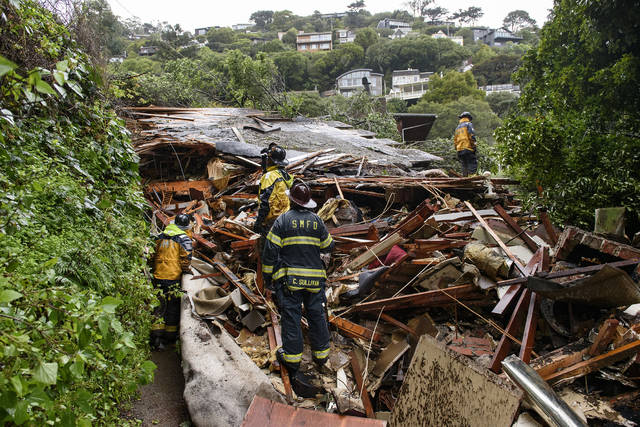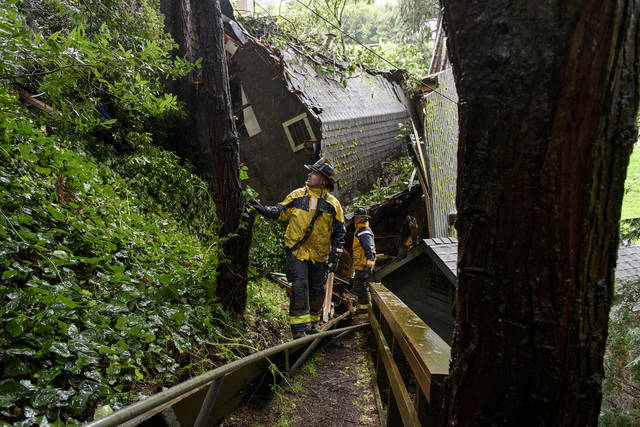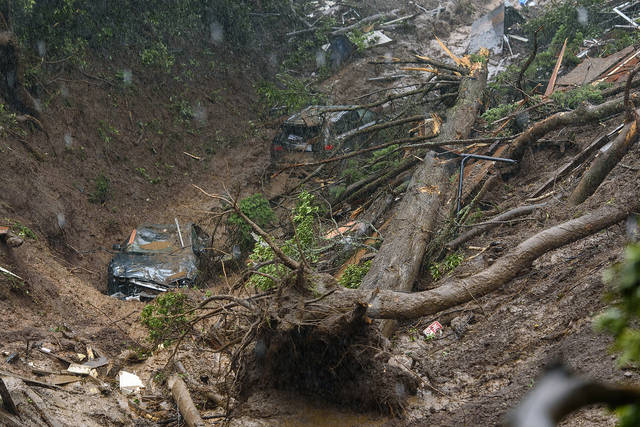LOS ANGELES — Waves of heavy rain pounded California on Thursday, flooding streets, triggering a mudslide that destroyed homes and forcing residents to flee communities scorched by wildfires last year.
The storm deluged Southern California after walloping northern parts of the state and southern Oregon. A mudslide in Sausalito, north of San Francisco, barreled over cars, uprooted trees and sent a home sliding down a hill and smashing into another house.
A woman was rescued from the splintered wreckage of the home. At least 50 properties were evacuated from the hillside neighborhood, KNTV reported.
Officials ordered people to leave areas burned bare by a summer wildfire in the Santa Ana Mountains as flash flood warnings blanketed a huge swath east and south of Los Angeles.
They also told parts of artsy Laguna Beach to evacuate, while the desert resort city of Palm Springs urged residents to stay where they were because of flooded streets. Flood advisories extended east to Arizona.
Weather was so severe that the Hollywood Walk of Fame had to postpone the dedication of a sidewalk star honoring the band Aerosmith. The Knott’s Berry Farm and Six Flags Magic Mountain theme parks closed.
Conditions proved too wet for the Genesis Open at Riviera Country Club in Los Angeles, where play was halted after less than an hour.
The National Weather Service reported staggering rainfall amounts, including more than 9.4 inches (24 centimeters) over 48 hours at one location in the San Bernardino Mountains.
Trouble persisted in the saturated north, where thousands lost power and flood warnings in effect for a large area of the upper Central Valley and around the San Francisco Bay Area.
A flooded creek led authorities to urge about 300 residents to leave a Northern California community some 20 miles (32 kilometers) west of Paradise, a town destroyed last year by the nation’s deadliest wildfire in a century.
The storm followed more than a week of severe weather in the Pacific Northwest and was the latest in a series of storms that has all but eliminated drought-level dryness in California this winter. It’s fueled by an atmospheric river — a plume of moisture stretching across the Pacific Ocean nearly to Hawaii.
Nearly 37 percent of California had no level of drought or abnormal dryness, the U.S. Drought Monitor reported Thursday. About 10.5 percent of the state was in moderate drought, just over 1.6 percent was in severe drought. The remainder was in the abnormally dry category. The numbers reflect data gathered up to Tuesday.
Atmospheric rivers are long bands of water vapor that form over an ocean and flow through the sky. Formed by winds associated with storms, they occur globally but are especially significant on the West Coast. When an atmospheric river originates near Hawaii it is commonly referred to as a “Pineapple Express.”
Even before the height of the storm, mandatory evacuations were ordered near the wildfire area in the Santa Ana Mountains where officials said there was a high risk of debris flows.
Resident Tim Suber chose not to leave his hillside neighborhood at Lake Elsinore. He said Thursday that he’s lost count of how many times his family has been evacuated between last summer’s devastating wildfire and this winter’s storms.
The rain was so heavy that “it sounds like a hundred bowling balls a minute are going down the creek” behind his house, Suber said. A neighbor had mud in his pool, but so far the area hadn’t lost power and culverts and washes were handling the runoff.
A state of emergency was declared in Shasta County because of significant storm damage, and thousands of customers lost power. It comes after a fire in the county seat of Redding last summer destroyed more than 1,000 homes and killed eight people.
The storm delayed flights destined for San Francisco International Airport, closed scenic Highway 1 in at least four spots on the Central Coast and shut down U.S. 395 in the snowy eastern Sierra Nevada.
Wintry weather closed Interstate 80 across much of Wyoming and sections of at least four other highways.
———
Associated Press writers Olga Rodriguez in San Francisco, Christopher Weber, John Rogers and Amanda Lee Myers in Los Angeles, Chris Grygiel in Seattle and Scott Sonner in Reno, Nevada, contributed to this report.





